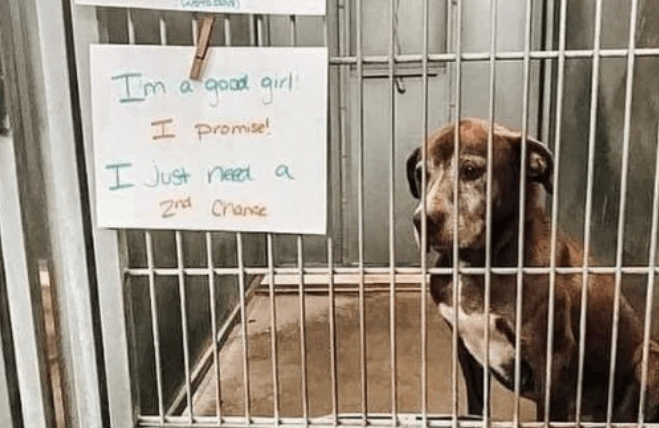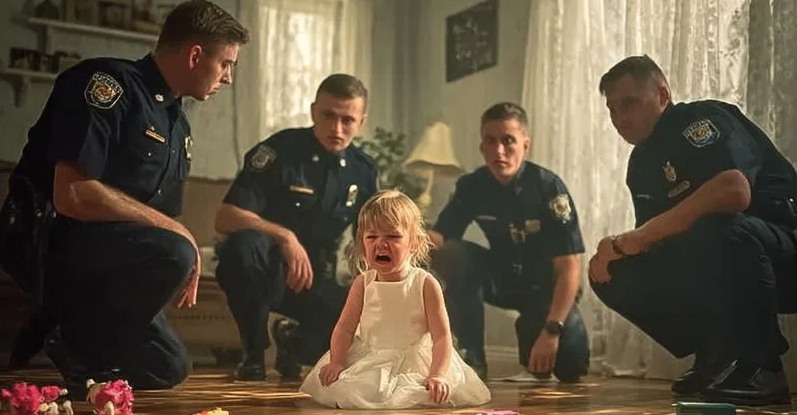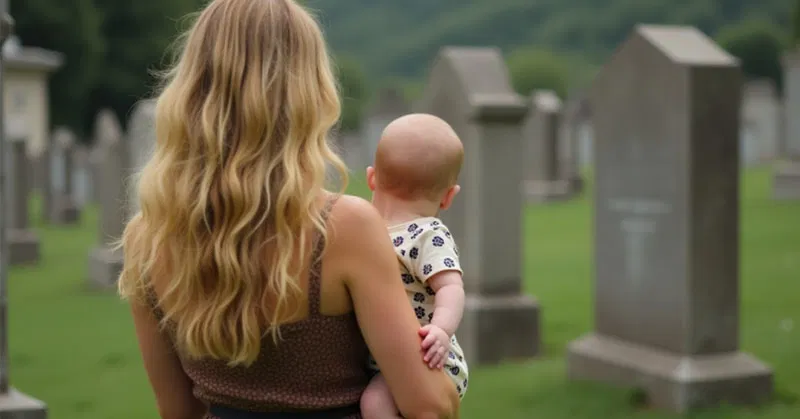I was only there to drop off some old towels, a simple errand. You know, one of those “small good deeds” you do when you’re desperately trying to feel useful, feel purposeful, after yet another crushing job rejection and a disheartening voicemail from your ex saying she’s moved on.
But as I casually walked past the kennels, something intangible made me abruptly stop. It wasn’t frantic barking. It wasn’t sad whining. Just… profound silence, an unsettling quietude. And then, amidst that silence, I saw her, a solitary figure.
A brown dog with soft, graying fur, sitting perfectly still, almost unmoving, like she had utterly forgotten what hope genuinely felt like. Two crudely taped signs on the kennel bars, written in what distinctly looked like a child’s handwriting, said it all, eloquently: “Hi! I’m Ginger! I’ve been patiently waiting here 7 years, 9 months, 2 weeks, 2 days. I’m a good girl! I promise! I just urgently need a second chance.”
Seven. Long. Years.
My throat suddenly tightened, a lump forming. I slowly crouched down, meeting her gaze. She didn’t bark. She didn’t move towards me, not even an inch. She just looked at me with an eerie stillness, like she no longer believed anyone truly saw her anymore.
And I hadn’t come here for this emotional burden. I can barely pay my own rent, a constant struggle. I live completely alone, isolated. I’m actively rebuilding my fractured life, piece by painful piece. But somehow, almost instinctually, I heard myself say, “Hey, Ginger,” and she stood up, just once, a slow, deliberate movement. Quiet and incredibly careful, as if afraid to disturb the moment.
Her deep, soulful eyes locked with mine like she remembered something profound about people, a trust, something I hadn’t yet earned, but desperately wanted to.
The compassionate volunteer then explained Ginger’s tragic story: she’d been surrendered after her beloved owner died, suddenly. That she’d silently watched every single other dog joyfully leave this shelter while she perpetually stayed, remaining behind, year after year. That they had nearly stopped putting her up for adoption altogether, losing hope.
But I didn’t give up on her, not then, not ever. I sat right there, down against the cold kennel bars.
And for the very first time in many, many weeks, the pervasive silence didn’t feel lonely, it felt strangely comforting.
So I quietly asked, my voice barely a whisper, “What if we both got a second chance at life, Ginger?”
And right then—in that very moment—she pressed her paw gently to the bars, a silent plea.
I left the shelter that day without actually adopting her immediately. Not because I didn’t desperately want to— but because I kept agonizingly wondering what burdens I could genuinely take on versus what responsibilities I absolutely shouldn’t, for my own stability. My life already felt like a precarious tightrope walk, every step uncertain. Adopting a senior dog, with all her unknown needs, seemed reckless, irresponsible.
Still, her haunting face stayed vividly with me. Those deep, steady, knowing eyes haunted me throughout the long, sleepless night. By morning, I promised myself I’d definitely go back— just to check on her, nothing more. Maybe bring some tasty treats or a soft, warm blanket. Nothing serious, just a small gesture.
But when I arrived the next day, something palpable had changed. The shelter manager met me with a somber, worried look on her face. “Ginger’s not doing well today,” she said gently, her voice full of concern. “She completely stopped eating yesterday, didn’t touch her food. We think… sometimes, older dogs just simply give up hope if they’ve waited far too long for a home, for love.”
That chilling revelation hit me like a physical gut punch, a painful blow. “Waited too long” felt like an undeniable death sentence, a finality. This sweet dog had loved someone profoundly, unconditionally. Had done absolutely everything right, perfectly. And now she was tragically fading away— not because of anything she had done wrong, but purely because no one, absolutely no one, had shown up for her, to save her.
I didn’t wait another second. I signed the adoption papers on the spot, without hesitation, my hand steady, my resolve firm.
Bringing Ginger home was both tougher and easier than I had ever imagined. Tougher because she was clearly grieving, deeply mourning— not just the loss of her first owner, her beloved human, but the entire life she once believed in, the future she envisioned. She barely moved from her window bed for weeks, a brown lump, staring mournfully outside like she perpetually expected someone else to return, to claim her.
Easier because, in the act of genuinely caring for her, I was forced to meticulously care for myself again, to prioritize my own well-being. Feeding her meant I had to start eating real, nourishing meals again myself. Walking her got me physically out of the cramped apartment where I’d spent far too many isolating hours doom-scrolling job sites or morbidly replaying old, painful arguments in my head, a destructive loop.
One evening during a peaceful walk, a kind neighbor stopped us politely. “Is she yours?” she asked gently, a warm smile on her face.
“She’s new,” I said, scratching affectionately behind Ginger’s soft ears.
“She fits you perfectly,” the woman replied, smiling knowingly before walking on, leaving me to ponder.
That simple comment stuck vividly with me, resonating deeply. Did Ginger truly fit me? Or did I finally fit something again, belong somewhere? Either way, it felt incredibly good to hear something positive about my life, a rare occurrence.
Slowly, gradually, things genuinely improved for both of us. A temp agency unexpectedly called with a short contract doing social media for a small, budding company. It wasn’t glamorous work, not at all, but it reliably paid the bills— and, crucially, the vet visits for Ginger. Ginger started to change too, remarkably. One rainy afternoon, while I diligently worked on social media captions, she playfully trotted over and dropped a gnawed-up tennis ball at my feet, a clear invitation.
“You want to play, Ginger?” I laughed, a genuine, joyful sound, and happily tossed it across the room. She chased it enthusiastically—not quickly, granted, but with enough sheer gusto to truly make me smile widely, a smile that reached my eyes.
Months peacefully passed. Ginger became more than just company; she became my anchor, my steadying force. When life felt too heavy, too overwhelming, I’d see her sleeping peacefully, innocently, and remember that things could indeed be simple, uncomplicated. When I seriously doubted myself, my abilities, watching her delight in something so small— sniffing a vibrant flower, chasing a whimsical leaf— reminded me to slow down, to appreciate the little things.
And then, something I didn’t expect, not at all, profoundly happened.
One crisp fall morning, we were walking leisurely in the park when a jogger slowed his pace near us, curious. His energetic golden retriever was straining excitedly on the leash, eager to meet Ginger, tail furiously wagging.
“Sorry,” he panted, slightly out of breath. “He’s always so excited to make new friends.”
“No worries at all,” I said as our dogs carefully sniffed noses, an introduction.
We chatted easily, comfortably. His name was Sam. We swapped phone numbers, saying we’d definitely meet again so the dogs could play freely, unrestrained.
At first, I honestly thought it was just a simple coincidence. Meeting someone else who loved dogs seemed nice, pleasant, nothing more, no expectations. But Sam soon invited us to a charming, dog-friendly café. We talked for hours—about challenging hiking trails, weird, obscure jobs we’d had, life after heartbreaking loss.
It felt incredibly easy. Natural. Like finding a long-lost version of myself I hadn’t seen in a while, rediscovered.
By winter, Sam and I were spending weekends together, a comfortable routine. Ginger and his dog, Max, were absolutely inseparable, true companions. Watching them joyfully romp through the fresh snow made my chest ache in the best possible way, a warmth spreading within me.
Then, one cold December evening, after sledding with the dogs, Sam pulled me gently aside, his expression serious.
“Can I ask you something, [Your Name]?” he said, his breath puffing visibly in the cold air.
“Sure, Sam,” I replied, curious.
He hesitated for a moment, then smiled, a hopeful warmth in his eyes. “Do you think Ginger wants a brother, a permanent companion?”
I blinked, surprised. “What, Sam?”
He gestured broadly between us, encompassing all four of us. “We’ve been doing everything together lately. The dogs clearly love each other, profoundly. Why not make it official, truly permanent? You, me, Ginger, Max—a real team, a family.”
For a brief moment, I froze, utterly stunned. Merging lives felt like an enormous leap, a monumental commitment. I’d worked so incredibly hard just to survive on my own, to simply get by. But then I looked at Ginger—her tail wagging happily beside Max— and I suddenly realized something profound: second chances aren’t just about making peace with the past. They’re fundamentally about courageously choosing a brighter future.
“Yes,” I said, smiling, my heart full. “I think she’d absolutely love that, Sam.”
A year later, everything is remarkably different, profoundly changed. Sam and I now share a warm, welcoming home with Ginger and Max. My temporary job miraculously became permanent, a stable career, and I’ve even started freelancing too, expanding my horizons. Ginger is thriving, genuinely flourishing in her new life. Her face visibly shows her age, the wisdom of years, but her boundless energy joyfully says otherwise, a youthful spirit.
Looking back now, with clear hindsight, I know with absolute certainty that adopting Ginger ultimately saved me as much as it undoubtedly saved her. She gently taught me how to slow down, to truly appreciate life’s simple moments, how to listen intently, with an open heart, and how to open back up myself, to love again, truly.
Life rarely hands us straightforward answers, neatly packaged— but sometimes it mercifully gives us a clear sign, a guiding light. Mine had soft brown eyes and patiently waited behind cold kennel bars.
If you’re currently doubting whether you’re truly ready for change— or even worthy of it, deserving of happiness— remember this powerful story: a small act of kindness, seemingly insignificant, might just profoundly change your entire life, unexpectedly.
Take the chance. Open the door. Someone might already be patiently waiting for you, just like Ginger was.
If this story moved you, please share it widely. And if you’ve ever found hope in an unexpected place, please drop your story in the comments below. We’d genuinely love to hear it.




